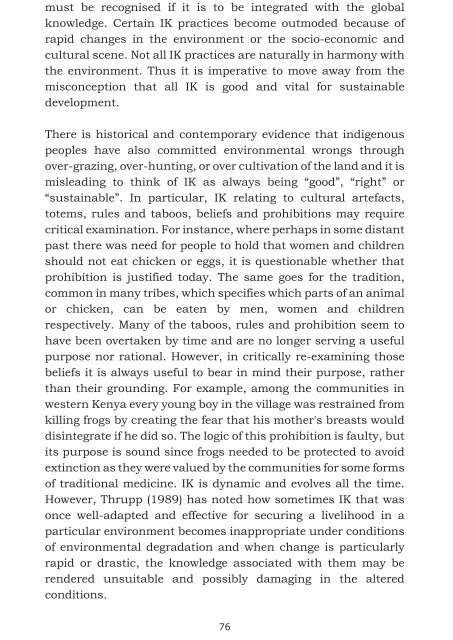Beneficiaries are actors too.pdf - Southern Institute of Peace ...
Beneficiaries are actors too.pdf - Southern Institute of Peace ...
Beneficiaries are actors too.pdf - Southern Institute of Peace ...
Create successful ePaper yourself
Turn your PDF publications into a flip-book with our unique Google optimized e-Paper software.
must be recognised if it is to be integrated with the global<br />
knowledge. Certain IK practices become outmoded because <strong>of</strong><br />
rapid changes in the environment or the socio-economic and<br />
cultural scene. Not all IK practices <strong>are</strong> naturally in harmony with<br />
the environment. Thus it is imperative to move away from the<br />
misconception that all IK is good and vital for sustainable<br />
development.<br />
There is historical and contemporary evidence that indigenous<br />
peoples have also committed environmental wrongs through<br />
over-grazing, over-hunting, or over cultivation <strong>of</strong> the land and it is<br />
misleading to think <strong>of</strong> IK as always being “good”, “right” or<br />
“sustainable”. In particular, IK relating to cultural artefacts,<br />
totems, rules and taboos, beliefs and prohibitions may require<br />
critical examination. For instance, where perhaps in some distant<br />
past there was need for people to hold that women and children<br />
should not eat chicken or eggs, it is questionable whether that<br />
prohibition is justified today. The same goes for the tradition,<br />
common in many tribes, which specifies which parts <strong>of</strong> an animal<br />
or chicken, can be eaten by men, women and children<br />
respectively. Many <strong>of</strong> the taboos, rules and prohibition seem to<br />
have been overtaken by time and <strong>are</strong> no longer serving a useful<br />
purpose nor rational. However, in critically re-examining those<br />
beliefs it is always useful to bear in mind their purpose, rather<br />
than their grounding. For example, among the communities in<br />
western Kenya every young boy in the village was restrained from<br />
killing frogs by creating the fear that his mother's breasts would<br />
disintegrate if he did so. The logic <strong>of</strong> this prohibition is faulty, but<br />
its purpose is sound since frogs needed to be protected to avoid<br />
extinction as they were valued by the communities for some forms<br />
<strong>of</strong> traditional medicine. IK is dynamic and evolves all the time.<br />
However, Thrupp (1989) has noted how sometimes IK that was<br />
once well-adapted and effective for securing a livelihood in a<br />
particular environment becomes inappropriate under conditions<br />
<strong>of</strong> environmental degradation and when change is particularly<br />
rapid or drastic, the knowledge associated with them may be<br />
rendered unsuitable and possibly damaging in the altered<br />
conditions.<br />
76


